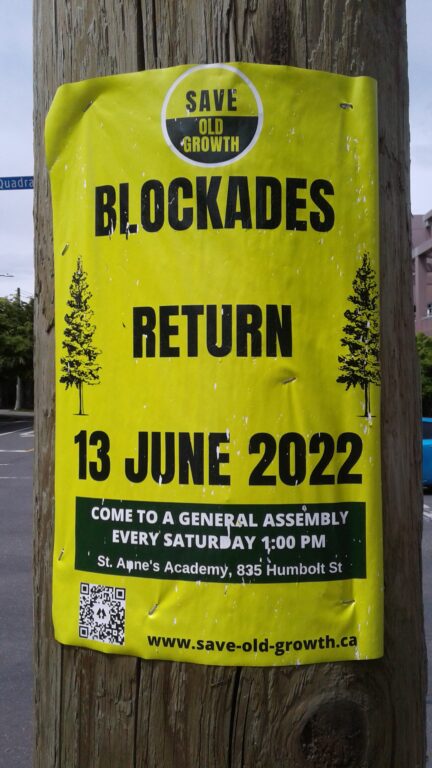I Attended a Save Old Growth Training Session
You may have read about Save Old Growth in the media, but have you met them in person? I did.

Save Old Growth has been all over the news lately, with multiple forms of protests, most notably blockades. My take on them was apprehensive: I support the cause, but felt their strategy was proving counterproductive. Nevertheless, I seized an opportunity to meet these people in person and listen to them firsthand, as part of a training session I attended noncommittally but also without prejudice; whether I would contribute anything would depend on what I heard, and I had no problem telling them just that.
Obviously I’m not going to divulge anything sensitive or incriminating in this article; I merely mean to give my honest impression of their approach. Most of what follows has already been made public by the group anyway, in one form or another.
We met outside St. Anne’s Academy at 1PM. Peak attendance was eighteen, myself included, but it was said that many regulars could not attend and would instead participate in the Zoom meeting later. Our meeting would be interrupted by a lady in charge of the institution, who had warned us in advance that we might have to relocate elsewhere on the property since that particular spot had been rented out for the afternoon, and indeed a while later she would come back to please very nicely kindly vacate to make room for the group… while flanked by a police officer we were supposed to believe just walked by. There was no tension and we indeed just moved somewhere on the lawn where we would no longer be interrupted… although I can’t help wondering whether the charming police officer was indeed just there by coincidence.
Early in the meeting I had the opportunity to share my concern that they were losing the fight in the court of public opinion, but it turned out some of them had reached a similar conclusion and felt the need to adapt, even though there would be no major change in tactics. They may be disruptive, but they’re not assholes or idiots. Some are even veterans of Fairy Creek and not only are they sensitive to the issue of collateral damage, they’re training themselves to put a good spin on it nonetheless and they’re rather persuasive. Forget the stereotypical hippy oddball who’s out of touch with reality; most of them are shrewd tacticians that can give just about anyone short of a rabid road rage motorist pause by showing them whatever inconvenience they incur pales in comparison to the threat the old growth logging constitutes.
I would say their strongest point is logistics. They can come up with a plan and carry it out in an organised fashion. They assign roles, keep track of their assets, anticipate all kinds of scenarios, and come up with contingencies for just about anything imaginable. They know how the police operates, how bystanders will react, how the legal system works, how to interact with the media. And they understand the value of secrecy as well; the organisers didn’t disclose any overly sensitive details of upcoming events, with the understanding there could be a leak… or even an informant among our numbers (they were probably suspicious of me in particular!).
Those who attend are expected to take part in training pertaining to confrontation and arrest, which includes roleplaying. One might think this is a bit dumb, but it was actually insightful. Every little detail is pondered and discussed, and the veterans in particular know what to expect and what to do throughout the protest and beyond. They also understand the importance of support roles; not everybody who goes there means to get arrested. One may instead be a liaison officer, a deescalation officer, a media spokesperson (I was offered such a role because I speak fluent French), a good will ambassador to the public, or just extra muscle.
Legal matters were also discussed. Those who attend such protests do so with the understanding they may get arrested and charged with a crime, whether they mean to or not, and that the resulting inconvenience may be significant even discounting incarceration. They also do so with the understanding the risk any charges sticking is between low and minimal, as long as they navigate the grey areas of the legal system and plead their case before the court of public opinion.
Honestly, I remain ambivalent pertaining to their strategy, but judging how they’re adjusting their aim in light of recent setbacks, I wouldn’t discount them just yet. If I had to make one criticism after the fact, it’s that the organisers may have spent too little time looking into legal recourse in addition to extralegal measures; both are not only compatible but arguably complementary. Retaliating before a court of law, accusing the government and logging companies of breaking the rules, would put the group on the offensive in the courtroom, improve its standing before the public, and press the psychological advantage, even if the lawsuit were to ultimately fail, while yielding a nice endgame if it succeeds; instead, it looks to outsiders like they’re overly eager for a confrontation on the ground, which isn’t helping the group’s image problem one bit. And in environmental protests, winning in the court of public opinion is everything.
More on civil disobedience:
Discover more from Rulebreakers
Subscribe to get the latest posts sent to your email.



